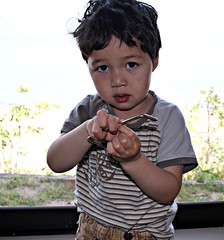Wednesday, May 12, 2010
Children are Staples (Ko wa Kasugai)
There is a Japanese saying to the effect that "Children are Staples," ("ko wa kasugai" 子はカスガイ・鎹).
My son here is seen above holding a staple or "kasugai," shown in close up in photo bottom left, which is used to hold two pieces of wood together, see photo bottom right.
In Japanese culture, the love between men and women is seen as being beautiful and natural, but like most things in nature, not particularly permanent. Love, between women and men does not last forever. There is no bridge across forever, no soulmate, no happy end. Japanese love stories tend, or tended, to end in double suicide: the most romantic outcome that one can hope for, at least far more so than domestic bliss.
The love or at least the relationship between parents and children, between ancestors and their descendants is however seen as being eternal. Parents and offspring are considered to be indivisible. No one is born again. This goes for the relationship between children and both mothers and fathers.
So when a couple have a child, while their own emotions for each other may wax and wane, they will be irretrievable linked forever in the flesh of their flesh, their child.
Hence, just as a staple can be used to join two pieces of wood together, so a children are considered to be like staples that join their parents together forever.
Westerners on the other hand are more likely to believe in the possibility of enduring love between men and women, through the transcendence of sexual difference. This hope, that there can be a bridge across forever, is perhaps dependent upon the repression of sex (much less festivals which celebrate sex), which is taboo, repressed, something to be sublimated into a unisex, shareable, idealised "love". I don't think that I need to refer to any particular cultural phenomenon to persuade Anglophones that Western culture is awash dreams of love. Oh, love.
While the Japanese believe that their view is natural, it may be dependent upon the repression of childbirth (seeing it, the desire for it, expressions of child birth, much less festivals which celebrate childbirth), which is taboo, repressed, and sublimated into a unisex, shareable and idealised "parent-child-love". While ancestor worship, or ancestor veneration, is carried out behind closed doors, the clearest expression of the cult of parent child love in Japan, is in the "monstrous" hegemony of cute found in Japan.
Related there are
Children are the shackles of this world and the next (ko ha sankai no kubikase 子は三界の首枷, こはさんかいのくびかせ) which refers to pretty much the same thing.


My son here is seen above holding a staple or "kasugai," shown in close up in photo bottom left, which is used to hold two pieces of wood together, see photo bottom right.
In Japanese culture, the love between men and women is seen as being beautiful and natural, but like most things in nature, not particularly permanent. Love, between women and men does not last forever. There is no bridge across forever, no soulmate, no happy end. Japanese love stories tend, or tended, to end in double suicide: the most romantic outcome that one can hope for, at least far more so than domestic bliss.
The love or at least the relationship between parents and children, between ancestors and their descendants is however seen as being eternal. Parents and offspring are considered to be indivisible. No one is born again. This goes for the relationship between children and both mothers and fathers.
So when a couple have a child, while their own emotions for each other may wax and wane, they will be irretrievable linked forever in the flesh of their flesh, their child.
Hence, just as a staple can be used to join two pieces of wood together, so a children are considered to be like staples that join their parents together forever.
Westerners on the other hand are more likely to believe in the possibility of enduring love between men and women, through the transcendence of sexual difference. This hope, that there can be a bridge across forever, is perhaps dependent upon the repression of sex (much less festivals which celebrate sex), which is taboo, repressed, something to be sublimated into a unisex, shareable, idealised "love". I don't think that I need to refer to any particular cultural phenomenon to persuade Anglophones that Western culture is awash dreams of love. Oh, love.
While the Japanese believe that their view is natural, it may be dependent upon the repression of childbirth (seeing it, the desire for it, expressions of child birth, much less festivals which celebrate childbirth), which is taboo, repressed, and sublimated into a unisex, shareable and idealised "parent-child-love". While ancestor worship, or ancestor veneration, is carried out behind closed doors, the clearest expression of the cult of parent child love in Japan, is in the "monstrous" hegemony of cute found in Japan.
Related there are
Children are the shackles of this world and the next (ko ha sankai no kubikase 子は三界の首枷, こはさんかいのくびかせ) which refers to pretty much the same thing.


Labels: family, gender, nihobunka, nihonbunka, sex, Shinto, 宗教, 日本文化
Comments:
<< Home
Timothy,
Nice post. I enjoyed reading your take on "ko wa kasugai."
Did you know there is a rakugo story by the same title? It is quite touching.
Best,
Matt
Post a Comment
Nice post. I enjoyed reading your take on "ko wa kasugai."
Did you know there is a rakugo story by the same title? It is quite touching.
Best,
Matt
<< Home
This blog represents the opinions of the author, Timothy Takemoto, and not the opinions of his employer.



